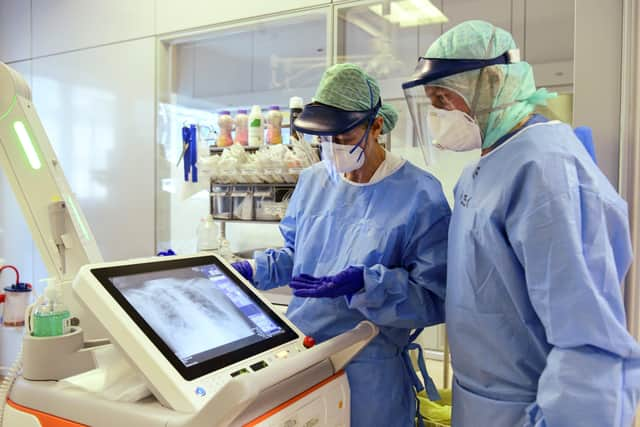Fears over thousands of ‘long haul’ Covid-19 sufferers
But the 50-year-old was admitted to hospital again two days ago still struggling with breathlessness after having 11 weeks of persistent, often terrifying symptoms.
At times Ms Farr, an engineer from Edinburgh, has gone to sleep fearing she would not wake up.
Advertisement
Hide AdAdvertisement
Hide AdShe said: “It has been a dark time. I felt so vulnerable. I have been unable to work since March.”


According to the World Health Organisation (WHO), patients with Covid-19 typically recover within about two weeks.
Yet there are nearly 4,000 members of UK Facebook groups comprising people such as Ms Farr who are described as “long haulers”, and many in support groups for survivors sharing stories of persistent symptoms.
Researchers examining the Covid-19 app data have discovered as many as one in ten suffer for three weeks or more, and some have issues for months.
The findings from the symptom study is the first official indication of how many people are being affected by longer lasting Covid-19 effects. Just over 3.8 million people contributed to the study.
Many patients like Ms Farr feel doctors have dismissed them as so-called “mild” cases.
Despite months of recurring symptoms, the mother-of-two’s illness has been put down to anxiety.
Ms Farr first developed a dry cough and a feeling of pressure on her chest on 27 March, followed by fever, diarrhoea, severe fatigue and a rash above her kidneys as well as a metallic taste in mouth.
Advertisement
Hide AdAdvertisement
Hide AdOver three months Ms Farr’s symptoms returned, often after days of feeling better. The shortness of breath is so severe at times she can’t manage a short walk.
She said: “After eight weeks I woke at 4am with worsening breathlessness and called NHS 24. They didn’t believe I had been ill so long.
“I went to A&E and they found streaks in my lungs but said they weren’t worried. They told me that I probably had anxiety. I was furious. The worst thing is not knowing what to do to help yourself.
“I just got out of hospital again two days ago after being rushed in with a suspected clot in my lungs. After a scan they still don’t know why I am having continued breathing problems, three months later.
“I was sent home and told to refer back to my GP again. It’s so frustrating.
“People with so-called mild cases don’t seem to be getting recognition or support. It’s negligence. People need proper care.”
Doctors have expressed growing concerns about the numbers of people in long-term recovery.
Experts have found side-effects of Covid-19 including low oxygen levels, especially at night, loss of balance and persistent symptoms despite repeated negative tests for the virus, as well as general weakness, chest pain and blot clots. They remain uncertain as to why some patients struggle to fully recover from the virus.
Advertisement
Hide AdAdvertisement
Hide AdProfessor Colin Berry of Glasgow University, a heart expert, said: “As this virus is so new it’ll take time to fully investigate what we are up against. But we’re already seeing for some hospitalised patients, and some who have taken ill at home, the consequences are serious and long-lasting.”
Dr Alistair Forbes, deputy chairman of the Royal College of GPs in Scotland, said: “Symptoms can last one to two months or more. Patients have done the right thing by isolating at home but they have to weather the storm with little to no treatment available.
“I’ve seen increasing reports of post-viral affects. When we look at the total across the country, we will be dealing with a significant number of people.”
Dr Forbes called for clear guidance on testing and recovery planning, adding: “Getting guidance soon on how to use the antibody test would be very useful. It’s difficult to get accurate results from the current swab test.”
And he said: “It’s unsettling but we have to give an honest answer and say we don’t know how long it will take for people to recover, especially if they get an inflammatory response that is likely to lead to what presents like post-viral fatigue.
“We can refer them to online support groups. We are frustrated too, but we just don’t know how best to help these patients yet.”
Dr Tracey Gillies, medical director of NHS Lothian, said: “We cannot discuss an individual patient’s care without their consent. Generally, however, if a patient attended the emergency department with breathlessness or were otherwise unwell, they would be clinically assessed and treated by one of our team.
“It is known that patients can suffer breathlessness and fatigue for several weeks after a diagnosis of Covid-19.
Advertisement
Hide AdAdvertisement
Hide Ad“If people have symptoms of Covid-19, such as a high temperature, a new, continuous cough, or a loss or change to their sense of smell or taste, and are not acutely unwell, they can request a home testing kit or arrange an appointment at a testing centre by logging on to NHS Inform.”
Comments
Want to join the conversation? Please or to comment on this article.